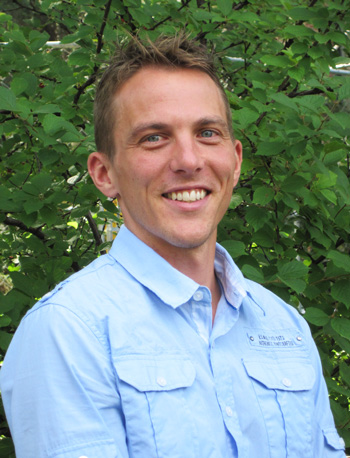
Craig Cameron works with the tri-partite agreement partners: the faculty, ARPA and ATPR, to bring to fruition their goals to advance the recreation profession through professional development, and lay the groundwork to establish a Centre for Excellence in Community Recreation.
To Craig Cameron, it's all about the connection - drawing the lines, connecting the dots between three different organizations whose interests align. Newly hired from the University of Regina where he's completing a doctoral degree in inter-organizational relationships in international development through sport, Cameron has stepped into the role of senior liaison for the tri-partite agreement the faculty has with the Alberta Parks and Recreation Association and Alberta Tourism, Parks and Recreation.
He's filling the shoes of Doug Brimacombe who'd spearheaded the first three years of the partnership and facilitated the coalescence of the partners' goals.
Cameron's task will be to take the partnership to the next level to help realize some of the partnership's broader goals. That'll mean "… working on individual projects for all three of the partners as well as facilitating some joint efforts," he says.
For the faculty this will mean teaching: he'll be teaching three recreation and leisure studies courses, including program planning and leisure leadership.
For ARPA, "I'll be helping to develop a professional development piece for their members," he says, explaining that ARPA has identified 12 core competencies for practitioners. "They're hoping I can help to turn those competencies into a variety of courses geared toward practitioners who are new in their career, at the mid-mark or with a lot of experience. We want to determine what types of courses, experiences or opportunities they'd like in terms of their professional development targeted to day-to-day tasks and specific skills of the profession."
He hopes to weave this work into the faculty's expert knowledge - and benefit students too. "I really want to involve some recreation faculty members in helping ARPA to develop its course content," he says, "seeing as how many of the recreation and parks professional in this province are University of Alberta grads, this is an excellent opportunity to explore ways to complement the theoretical experience of university with the practical skills required in the workplace". Cameron notes "that while students gain valuable practical experience through their practicum, ARPA's focus is to support professional s already in the field."
Cameron will be applying his research skills on the project he'll be working on with the Ministry of Tourism, Parks and Recreation. Earlier this year the ministry rolled out its Active Alberta Policy and is anxious to develop markers to evaluate the effectiveness of the policy in getting Albertans moving. "We've met to talk about developing a research agenda in line with their policy. ATPR is interested in demonstrating that the Active Alberta Policy has made a meaningful contribution in shaping the overall wellbeing of Albertans. And, of course, I want to see if there's a way to align their needs with what we're doing as a faculty.
"There are definitely opportunities here to engage faculty and the university to shape the research methods or the broader concepts or topics that could be important for monitoring, measuring and evaluating recreation and leisure in the province. Really, this is an opportunity to engage all of the partners in setting a practical research agenda," says Cameron.
Jointly, the partners remain committed to realizing their dream of establishing the Normie Kwong Centre for Community Recreation Excellence, proposed as a hub for recreation and leisure research, knowledge transfer and promotion. "Here, as well, I will be working with the partners to bring their vision to reality. I hope that the research agenda and professional development curriculum are things for the centre to build on when it's opened."
One of the most exciting parts of the job will be moving the partnership beyond what Cameron calls the "dating stage" and into "more active and engaged opportunities for working together."
"The partners have similar objectives and are moving in similar directions but don't necessarily have the mechanisms for communicating the actions or plans back and forth or acting on them in a mutually supportive way," says Cameron. "The partnership has gone through the introductory phase, they trust each other more than ever. Now they are interested in maximizing what they can do together."
That's a challenge Cameron's keen to bite into. "Alberta is a leader in recreation and leisure policy and is poised to be a leader on a number of recreation and leisure fronts," he says. "If we are able to develop a good professional development product here and establish a strong research agenda, it's another opportunity to set the pace and become the model for multi-party partnership. There is no reason that the success of this partnership cannot be replicated in other provinces or territories across Canada."